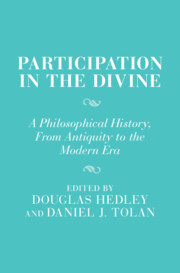Book contents
- Participation in the Divine
- Cambridge Studies in Religion and Platonism
- Participation in the Divine
- Copyright page
- Contents
- Contributors
- Foreword
- Acknowledgements
- Introduction
- 1 The Lord Is One
- 2 The Place and Scope of Participation in the Divine in the Thought of Plato
- 3 Origen on Participation
- 4 Forms, Intellects, and Angels
- 5 Participation in the Divine in Gregory of Nyssa
- 6 Augustine’s “Illumination” Theory as the Natural Participation of the Human Mind
- 7 The Principle of Cosmic Unification in the Athenian School of Platonism
- 8 St. Maximus the Confessor on Participation
- 9 Participation in Medieval Platonism
- 10 Participation as God’s Indwelling
- 11 Some Late Medieval Discussions of Participation in the Divine
- 12 Music, Temperance, and Participation in Marsilio Ficino
- 13 Richard Hooker’s Metaphysics of Divine Participation
- 14 The Transcendence of Holiness
- 15 Ralph Cudworth on Causality and Substantial Forms
- 16 The Romantic Legacy
- 17 Participation Revived and Revised
- Index
- References
7 - The Principle of Cosmic Unification in the Athenian School of Platonism
Published online by Cambridge University Press: 23 November 2024
- Participation in the Divine
- Cambridge Studies in Religion and Platonism
- Participation in the Divine
- Copyright page
- Contents
- Contributors
- Foreword
- Acknowledgements
- Introduction
- 1 The Lord Is One
- 2 The Place and Scope of Participation in the Divine in the Thought of Plato
- 3 Origen on Participation
- 4 Forms, Intellects, and Angels
- 5 Participation in the Divine in Gregory of Nyssa
- 6 Augustine’s “Illumination” Theory as the Natural Participation of the Human Mind
- 7 The Principle of Cosmic Unification in the Athenian School of Platonism
- 8 St. Maximus the Confessor on Participation
- 9 Participation in Medieval Platonism
- 10 Participation as God’s Indwelling
- 11 Some Late Medieval Discussions of Participation in the Divine
- 12 Music, Temperance, and Participation in Marsilio Ficino
- 13 Richard Hooker’s Metaphysics of Divine Participation
- 14 The Transcendence of Holiness
- 15 Ralph Cudworth on Causality and Substantial Forms
- 16 The Romantic Legacy
- 17 Participation Revived and Revised
- Index
- References
Summary
In Marinus’s Life of Proclus, Syrianus introduces a young Proclus to Plutarch of Athens, (Marinus, Life of Proclus, 12), the first head of the Athenian School of Platonism. A relationship between these three men develops that shapes what is known as the Athenian School of Platonism. In his writings, Proclus refers to Plutarch as his “spiritual grandfather” and Syrianus as “master” or “teacher,” in some instances, “father.”1 The bond between the three philosophers is so great that they share a house in Athens, close to the temple of Asclepius and the theatre (Marinus, Life of Proclus, 12; , 81–96). Upon his death, Plutarch of Athens bequeathed leadership of the school to Syrianus, who became head of the Athenian School of Platonism in 432 (Marinus, Life of Proclus, 12).
- Type
- Chapter
- Information
- Participation in the DivineA Philosophical History, From Antiquity to the Modern Era, pp. 162 - 180Publisher: Cambridge University PressPrint publication year: 2024

